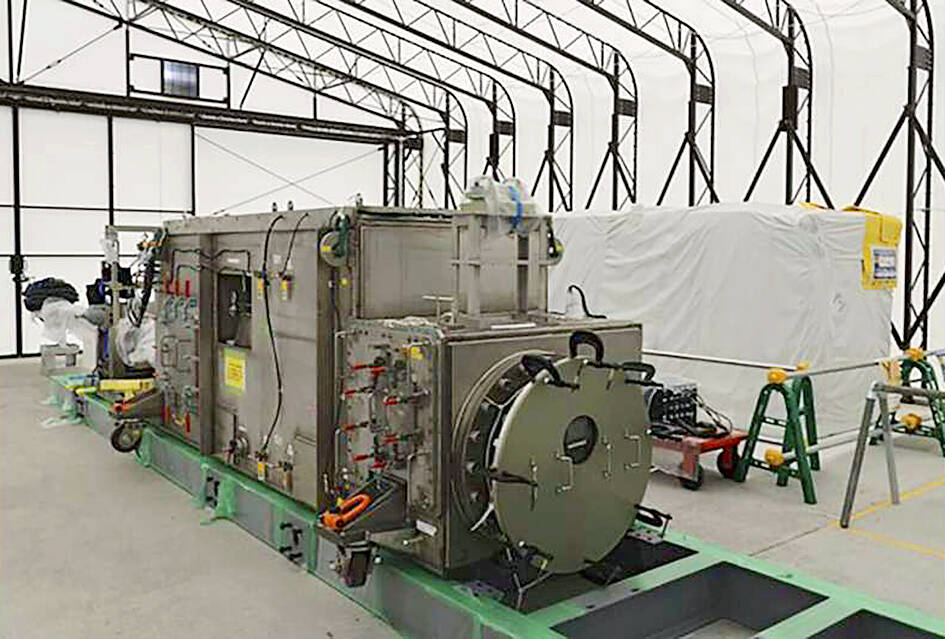An attempt to use an extendable robot to remove a fragment of melted fuel from a wrecked reactor at Japan’s tsunami-hit Fukushima Dai-ichi nuclear power plant was suspended yesterday due to a technical issue.
The collection of a tiny sample of the debris inside Unit 2 reactor’s primary containment vessel would start the fuel debris removal phase, the most challenging part of the decades-long decommissioning of the plant, at which three reactors were destroyed after a tsunami hit the site following an earthquake measuring 9.0 on the Richter scale on March 11, 2011.
The work was stopped when workers noticed that five 1.5m pipes used to maneuver the robot were placed in the wrong order and could not be corrected within the time limit for their radiation exposure, said Tokyo Electric Power Co Holdings (TEPCO), the plant’s operator.

Photo curtesy of TEPCO via AP
The pipes were to be used to push the robot inside and pull it back out when it finished. Once inside the vessel, the robot is operated remotely from a safer location.
The robot can extend up to about 22m to reach its target area to collect a fragment from the surface of the melted fuel mound using a device equipped with tongs that hang from the tip of the robot.
The mission to obtain the fragment and return with it is to last two weeks.
A new start date had not been decided, TEPCO said.
TEPCO president Tomoaki Kobayakawa said the priority was safety rather than rushing the process and that he planned to investigate the cause of the pipe setup problem.
“I understand that the decision was to stop and not push when there was a concern,” Kobayakawa told reporters in Niigata Prefecture, where he visited to discuss another TEPCO-operated nuclear power plant with the local community.
The sample-return mission is the first crucial step of a decades-long decommissioning at the Fukushima Dai-ichi site.
However, its goal to bring back less than 3g of an estimated 880 tonnes of radioactive molten fuel underscores the daunting challenges.
Despite the small amount of the debris sample, it would provide key data to develop decommissioning methods and necessary technology and robots, experts say.
Better understanding of the melted fuel debris is key to decommissioning the three wrecked reactors and the entire plant.
The Japanese government and TEPCO are sticking to a 30-to-40-year cleanup target set soon after the meltdown, despite criticism that it is unrealistic. No specific plans for the full removal of the melted fuel debris or its storage have been decided.

THE TRAGEDY OF PUNCH: Footage of the seven-month-old Japanese macaque has gone viral online after he was rejected by his mother and formed a bond with a soft toy A baby monkey in Japan has captured hearts around the world after videos of him being bullied by other monkeys and rejected by his mother went viral last week. Punch, a Japanese macaque, was born in July last year at Ichikawa City Zoo. He has drawn international attention after zookeepers gave him a stuffed orangutan toy after he was abandoned by his mother. Without maternal guidance to help him integrate, Punch has turned to the toy for comfort. He has been filmed multiple times being dragged and chased by older Japanese macaques inside the enclosure. Early clips showed him wandering alone with

South Korea would soon no longer be one of the few countries where Google Maps does not work properly, after its security-conscious government reversed a two-decade stance to approve the export of high-precision map data to overseas servers. The approval was made “on the condition that strict security requirements are met,” the South Korean Ministry of Land, Infrastructure and Transport said. Those conditions include blurring military and other sensitive security-related facilities, as well as restricting longitude and latitude coordinates for South Korean territory on products such as Google Maps and Google Earth, it said. The decision is expected to hurt Naver and Kakao

Australian Prime Minister Anthony Albanese yesterday said he did not take his security for granted, after he was evacuated from his residence for several hours following a bomb threat sent to a Chinese dance group. Albanese was evacuated from his Canberra residence late on Tuesday following the threat, and returned a few hours later after nothing suspicious was found. The bomb scare was among several e-mails threatening Albanese sent to a representative of Shen Yun, a classical Chinese dance troupe banned in China that is due to perform in Australia this month, a spokesperson for the group said in a statement. The e-mail

MONEY GRAB: People were rushing to collect bills scattered on the ground after the plane transporting money crashed, which an official said hindered rescue efforts A cargo plane carrying money on Friday crashed near Bolivia’s capital, damaging about a dozen vehicles on highway, scattering bills on the ground and leaving at least 15 people dead and others injured, an official said. Bolivian Minister of Defense Marcelo Salinas said the Hercules C-130 plane was transporting newly printed Bolivian currency when it “landed and veered off the runway” at an airport in El Alto, a city adjacent to La Paz, before ending up in a nearby field. Firefighters managed to put out the flames that engulfed the aircraft. Fire chief Pavel Tovar said at least 15 people died, but